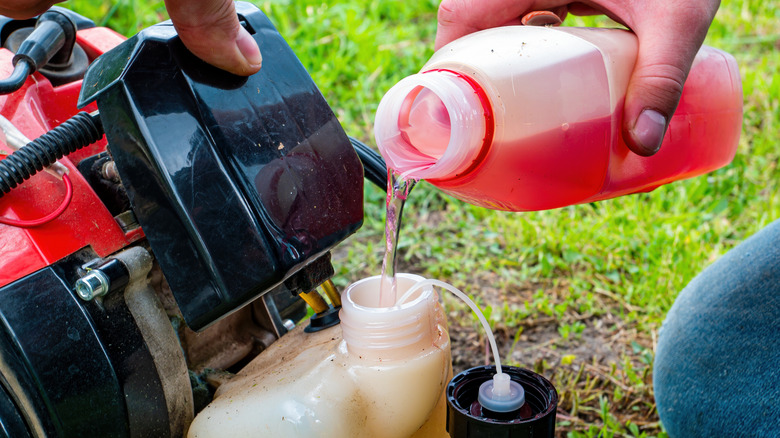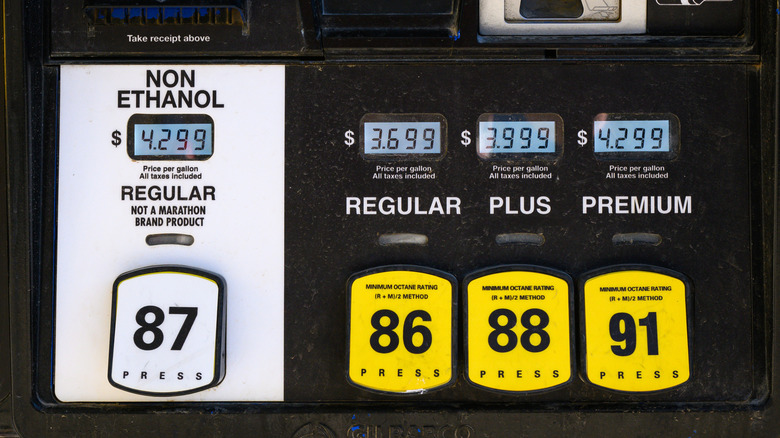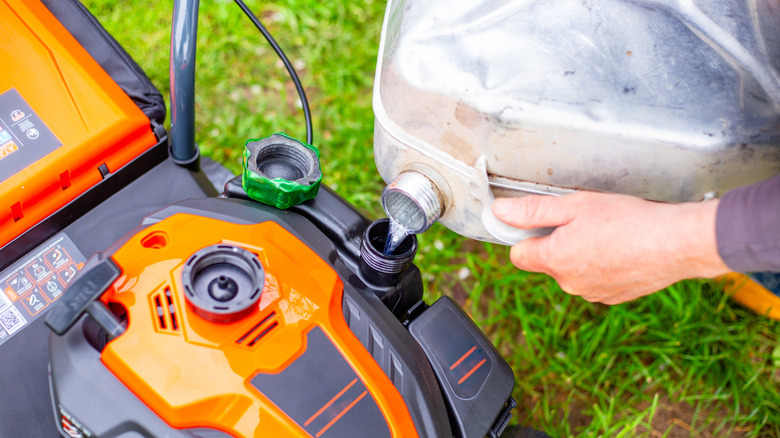Should You Use Ethanol-Free Fuel In Your Lawn Mower? Here's What You Need To Know
Nearly anyone with a lawnmower knows how frustrating it is to pull that starter cord only for the engine to fail to start. While this problem might be a result of blocked air filters, issues with the spark plug, or a clog in the fuel system, the kind of fuel you use could be just as important. Now, every time you roll up to the pumps, you might have seen gas pumps labeled "ethanol-free". As such, you may have wondered what it means.
Well, ethanol-free gas is, as the name suggests, just gasoline with no ethanol or fuel additives. Of course, it might not be quite as popular as ethanol-blended fuel, as it will probably be more expensive than anything else on the pumps. But still, some drivers prefer ethanol-free gas because it offers better mileage and reduces engine damage.
But does that really mean that you should consider using it with your outdoor power equipment, like your lawnmower? For the most part, mower engines are built to operate on regular unleaded gas with a high octane rating or gasoline that contains less than 10% ethanol. Experts claim, however, that the best fuel for most lawn mower engines is ethanol-free Gas (E0). After all, when you use blends with more ethanol than E10, you'll be asking for trouble, because blends like E15 can lead to poor engine performance or, even worse, shorten your mower's life by damaging the engine.
The pros of using ethanol-free gas in your lawn mower
One of the biggest perks of using ethanol-free gas is performance. Of course, it will not turn a standard mower into a high-performance machine, but you'll notice the difference. When ethanol is added to fuel, it tends to attract more moisture from the air. And since water is heavier than gasoline, it will sit at the bottom of the fuel tank and later be drawn to the engine. As such, your mower's engine will begin to stall, sputter, or refuse to start, especially after sitting through the off-season. Ethanol-free gas, on the other hand, doesn't absorb moisture, meaning if it sits in the fuel tank for a while, your mower will still start easier, idle smoother, and operate with more consistent power.
Another perk? Stability. Generally speaking, ethanol-blended fuels have a shorter service life, as they can break down in as little as three months. This means that you will have to replace or drain it if you are not planning to use your mower for an extended period. Contrary, ethanol-free gas will maintain its quality for months, as it doesn't degrade as quickly as gasoline blends. This makes it the best option for seasonal equipment like your mower, which isn't used all year-round. There's also the fact that ethanol-free gas has more energy and reduces risks like gumming and varnish build-up, which is quite common with ethanol-blended fuels.
When using ethanol-free gas doesn't make sense
Given what we've said so far, it makes sense to opt for ethanol-free gas. But there are certain scenarios in which you'll want to avoid using this gas in your mower. For instance, if you are aiming for a cost-effective solution. Now, we've previously established that ethanol-free gas is quite expensive compared to ethanol-blended gas. This means that while smaller yards will benefit from ethanol-free gas, the cost for larger yards will add up fast, and although the difference might not be much, you might end up draining your wallet.
Besides being expensive, there is also the issue of availability. Not every gas station has ethanol-free gas, and if you want to refill your lawn mower, you'll have better luck by using resources like Pure-Gas.org. And for many, that extra trip is not worth it, given that a mower can perform just fine when you use regular unleaded fuel, which is readily available and cheaper compared to ethanol-free gas. You can even use regular gas with up to 10% ethanol, as it will not pull enough water to cause problems within the engine. Plus, most modern lawn mowers are designed to handle this type of gas, provided that you don't make one common mistake that will damage your lawn mower, and which is, leaving old fuel sitting in the tank for months.


